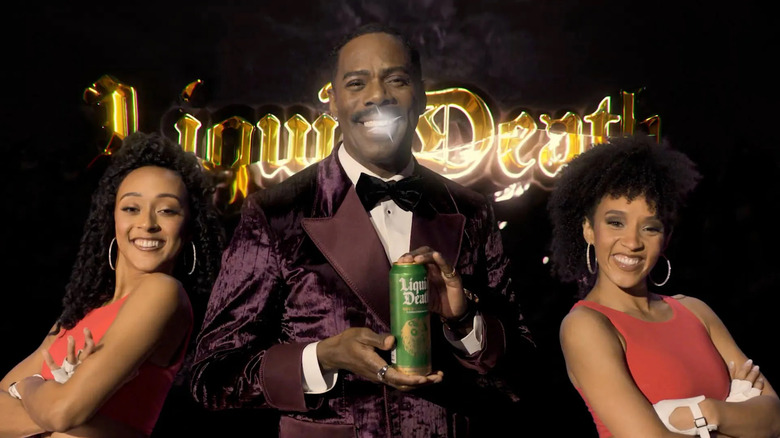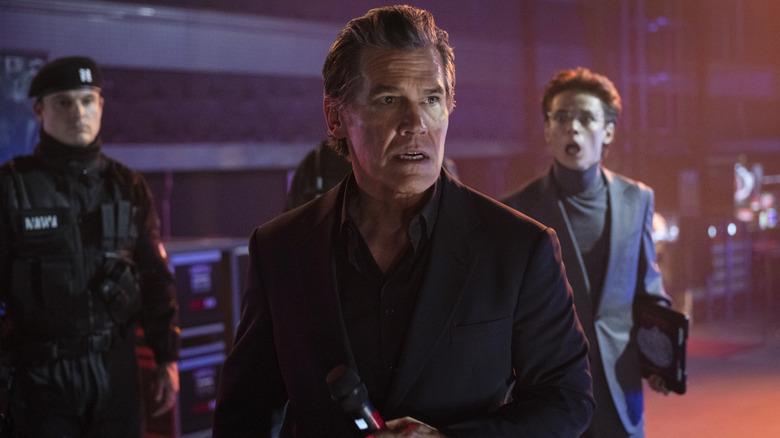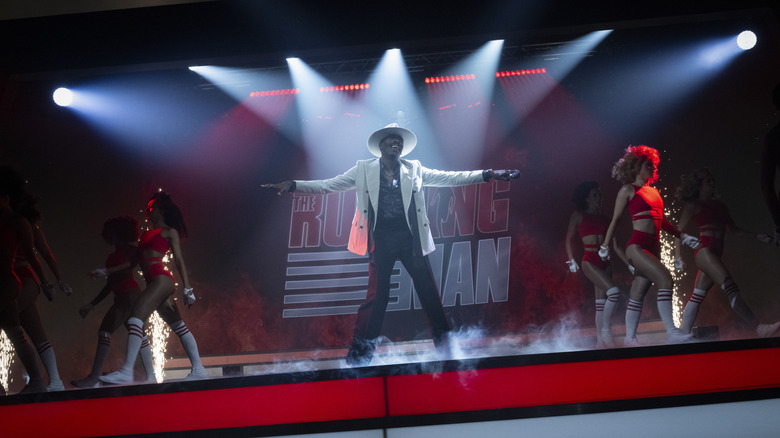The Running Man's Dystopian Product Placement Completely Misses The Point
This article contains spoilers for "The Running Man."
When your story takes place in a dystopian cyberpunk America, the politics are intrinsic. Edgar Wright's "The Running Man," like the Stephen King novel it's adapted from, and the 1987 Arnold Schwarzenegger movie, is inherently anti-corporate, anti-authoritarian, pro-labor, and anti-AI. The very premise — a futuristic game show where contestants are hunted for sport on free TV called "freevee," lambasts hollow commercialization.
And yet, the film is flooded with the most awkward product placement you could ask for. Tryouts for the Network's various violent game shows are conducted in Puma sneakers. Characters nosh on Funyuns and pound cans of Monster Energy. It's a paradoxical, technicolor blender of contemporary commercial culture that splats hard against the actual message of the film.
Are a few boxes of Cinnamon Toast Crunch enough to ruin the movie? No, but it's wild that no one thought to draw a hard line in the sand for this particular issue. The thing about product placement is that we all know how it works. No branded energy drink shows up on a movie screen by accident or without money changing hands. So while some might argue that real products don't break immersion in a near-future story, the economic reality of product placement can only hinder the overall message of the film — a message that, while inherent, "The Running Man" often seems uninterested in discussing directly.
The Running Man's product placement is a paradox
I'll say it again for the people in the back: You cannot make a film about commercialized violence that is itself an example of commercialized violence, and not expect some thematic blowback. At one point early on in the film, Colman Domingo's Bobby T. actually appears in a commercial for Liquid Death, the very real canned water company. Were I founder and CEO Mike Cessario, I would have opted for something a bit less on the nose than a literal technofascist commercial advertising my product.
The disconnect may be in the film's muddled relationship to its own tone. While every aspect of the in-universe "Running Man" show is barbaric, brutal, and designed to keep an indentured poverty class docile and obedient, the film cannot escape its own entertainment value, nor does it want to. Action movies are fun. Cyberpunk is fun. Edgar Wright wants to do car chases, gunfights, and let Michael Cera electrocute a squad of jackboots because it's funny.
This is perhaps the dilemma of adapting Stephen King's novel. On the page, the dark nature of hyperviolent reality TV can be kept at arm's length. But when you adapt that same material to its true medium, making the pomp and circumstance of technofascist entertainment real, there's a natural tension.
The Running Man's product placement belies a larger problem
I had a lot of fun watching "The Running Man." Wright is nothing if not an expert in aesthetics, and these days, the genre of cyberpunk lends itself naturally to his quick cuts and bright colors. But when it came to the messaging, I wanted more, and the product placement is a great example of why.
In an age of total theatrical insecurity, I understand that every movie can't be a dissertation on digital-age politics, nor should they try. But that is, in fact, the very fabric of "The Running Man," so like the product placement, its absence is hard to ignore. This is a movie that wants desperately to be interracial, but without interfacing at all with the actual racial politics of capitalism and class. It's a film that has to be revolutionary, but which skirts around the edges of any real discussion of what that means.
Elton is the film's best example of an actual political thinker, and his investment in the movement is played mostly for comic relief. This is more because Michael Cera was cast to do Michael Cera things, but when your only true revolutionary is written like a child, the message you're conveying intrinsically is that revolutionary politics are childish.
This is the opinion of Ben (Glen Powell) until the very end of the movie — that something adjacent to "traditional family values" is the better compass to follow than an actual anti-authoritarian politics. By the end, he's distributing leaflets and throwing Molotov cocktails, because in the world of "The Running Man," those are the inescapably heroic things to do. But the film rushes through this final arc of his character with no real interest in discussing, or even reflecting on, the shift. It wants desperately to be a less interesting movie, brought to you by Puma.


